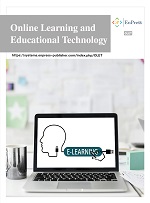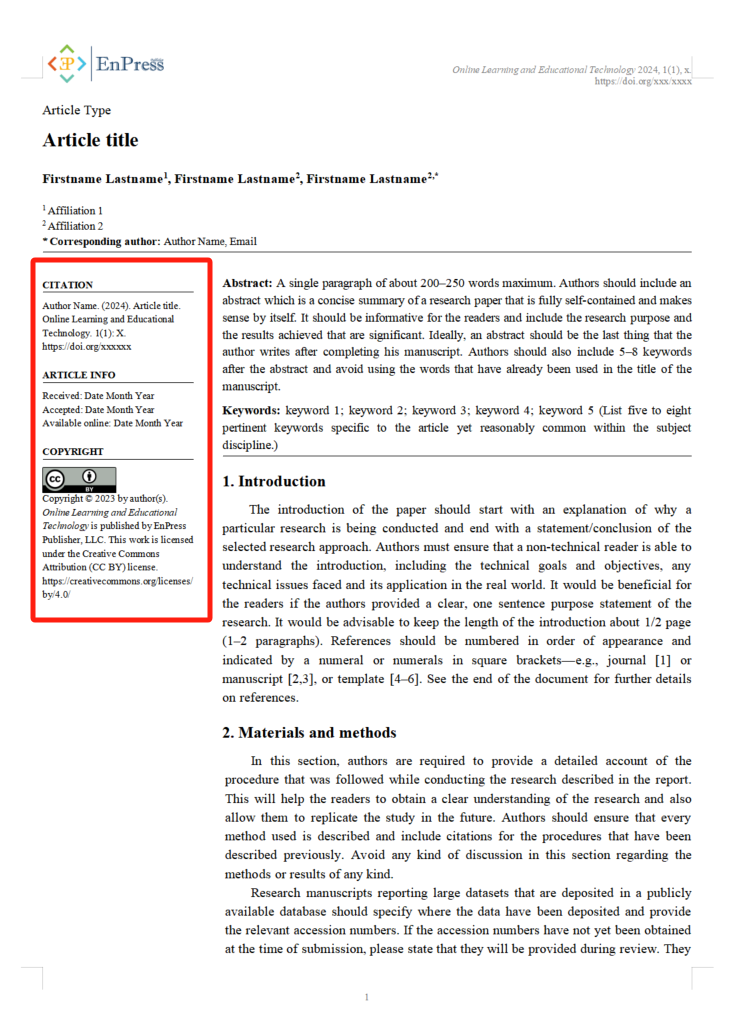|
Journal Abbreviation: Online. Learn. Educ. Tech. |
Online Learning and Educational Technology (OLET) is an open access peer-reviewed academic educational technology and online learning journal. The journal targets researchers, practitioners, and policy-makers of online distance learning and educational technology research fields. The journal publishes quantitative, qualitative, and mixed-method research papers. Extended reviews of substantive research studies and/or technical reports published elsewhere are also welcome. |
Online Submissions
Registration and login are required to submit items online and to check the status of current submissions.
Already have a Username/Password for Online Learning and Educational Technology?
GO TO LOGIN
Need a Username/Password?
GO TO REGISTRATION
Submission Preparation Checklist
As part of the submission process, authors are required to check off their submission's compliance with all of the following items, and submissions may be returned to authors that do not adhere to these guidelines.
- The submission has not been previously published, nor is it under the consideration of another journal (or an explanation has been provided in Comments to the Editor).
- The submission file is in Microsoft Word format.
- Where available, URLs for the references have been provided.
- The text adheres to the stylistic and bibliographic requirements outlined in the Author Guidelines, which is found in About the Journal.
- If submitting to a peer-reviewed section of the journal, the instructions in Ensuring a Blind Review have been followed.
Privacy Statement
The names and email addresses entered in this journal site will be used exclusively for the stated purposes of this journal and will not be made available for any other purpose or to any other party.
Article Processing Charges (APCs)
Online Learning and Educational Technology is an Open Access Journal under EnPress Publisher. All articles published in Online Learning and Educational Technology are accessible electronically from the journal website without commencing any kind of payment. In order to ensure contents are freely available and maintain publishing quality, Article Process Charges (APCs) are applicable to all authors who wish to submit their articles to the journal to cover the cost incurred in processing the manuscripts. Such cost will cover the peer-review, copyediting, typesetting, publishing, content depositing and archiving processes. Those charges are applicable only to authors who have their manuscript successfully accepted after peer-review.
| Journal Title | APCs |
|---|---|
| Online Learning and Educational Technology | $800 |
We encourage authors to publish their papers with us and don’t wish the cost of article processing charges to be a barrier especially to authors from the low and lower middle income countries/regions. A range of discounts or waivers are offered to authors who are unable to pay the article processing charges. Authors can write in to apply for a waiver and requests will be considered on a case-by-case basis.
*Article No. is mandatory for payment and it can be found on the acceptance letter issued by the Editorial Office. Payment without indicating Article No. will result in processing problem and delay in article processing. Please note that payments will be processed in USD. You can make payment through Masters, Visa or UnionPay card.
Vol 1, No 1 (2024)
Table of Contents
This research explores the impact of digital books on student’s performance in mathematics. The theoretical arguments of this research are based on the self-regulated learning theory. To employ the complete research strategy, 65 papers were retrieved in the first round of research, including 30 from Education Resources Information Center (ERIC), 20 from Science Direct, and 15 from Elton B. Stephens CO (EBSCO). Following that, only 40 papers produced findings from the major section screening. The article’s systematic literature review and thematic analysis of the published material resulted in a sample size of 23 articles for this study. A qualitative thematic analysis software, “NVivo 12”, was used to evaluate qualitative data. The findings indicated that motivation, technological advancement, information technology, learning objectives, sources for digital application, challenges of technology, traditional learning style, and visual information have a significant collision with students’ mathematical learning.
The present study addresses the perceptions of adolescent girls in Guerrero, Mexico, regarding the supervision of Information and Communication Technologies (ICT) by parents and teachers. It recognizes the importance of understanding these perceptions in the context of the increasing influence of ICT in the lives of adolescents and their impact on their development and online safety. A study was conducted involving 1900 participants, with 1260 girls from secondary school and 640 from high school, through a structured survey. Frequency analyses, measures of central tendency, and correlations were employed to examine the responses of the adolescent girls and understand their opinions on ICT supervision. The results revealed significant differences between the perceptions of secondary school and high school girls regarding ICT supervision. Secondary school girls showed a more favorable opinion towards supervision, while high school girls expressed greater concerns about privacy invasion. This study highlights the importance of considering adolescent girls’ perceptions regarding ICT supervision to develop more effective policies and educational practices. Furthermore, it underscores the need to promote safe and responsible use of ICT among adolescents by tailoring interventions to the specific needs of each group. Ultimately, this study is expected to contribute to creating a safer and more positive digital environment for future generations.
Announcements
The new submission template for 2024 is now available online |
|
We have revised the layout for articles to be published in the new issues, starting at the beginning of 2024. As of today, the article templates available for download on ‘Author Guidelines’ pages have been updated. The blank column on the left runs through all pages in an article. The revised layout was applied in the article pictured below, to serve as an example:
|
|
| Posted: 2023-12-07 | |
Let us give a warm welcome to Dr. Abdul Hafaz Ngah as the newest member of our editorial board |
|
.png) |
|
| Posted: 2023-08-11 | |
| More Announcements... |




 Open Access
Open Access

